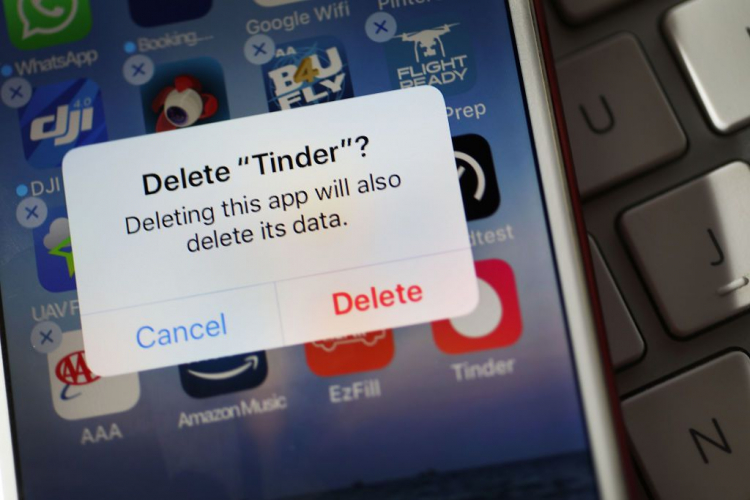Why You Should Ditch the Dating App

A study from the New York Times revealed that there are more than one billion swipes daily on Tinder by single (and often taken) people looking for the perfect match; most young people spend up to 90 minutes a day using dating apps. I remember the first time I swiped a match - it was 2012, and I had just moved back to Northern California after five years away. I couldn’t believe how easy it was to find a cute guy to date.
As I swiped through images of potential matches, I felt like a whole new world of options had opened up to me. Seven years later, Tinder has inspired the creation of countless other dating apps and altered our romantic lives forever. But with all the ease and convenience apps like Tinder, Bumble, and Happn offer, ultimately they do more harm than good.
Dating apps have created an endless amount of choice. Romantic hopefuls have become supermarket products, assessed only by their outward appearances. And we rarely buy. There is always another option just one swipe away in case things don’t go as planned. All this choice doesn’t lead to happiness.
According to an article from Women's Era, “more options often decrease satisfaction levels in humans. The laws of economics explains why we end up feeling miserable in the wake of more choices.” If you’re looking for something more than a fling, the only information about a potential match dating apps can provide is superficial. What we can’t know from apps is how kind and generous someone is, or if our values match theirs. Or even if they’re simply not a serial killer.
According to Aaron Ben-Zeév Ph.D., when assessing an appropriate match, “suitability includes characteristics, such as caring, sensitivity, kindness, generosity, and reciprocity.” Nevertheless, these qualities cannot be determined on an app, so we are forced to focus on superficial qualities. Which makes us value one another for the wrong reasons, and end up in unsatisfying partnerships.
Some argue that dating apps are more convenient and save us more time than having to find and chat up someone in real life. Some also feel they can screen a date easier. But what people list on their profile isn’t always who they are. Take Sarah, 25, for example, who recently met a guy on Tinder for a first date. When she asked about the dog in his photo, he revealed he used his friend’s dog for a photo opportunity, to “get girls,” and that he didn’t even like dogs. There is nothing sexy about being deceitful. Parisian Tinder user and marketing manager, Jason, 29, says he once showed up for a date with a girl who looked 20 years older than her photo. Being deceived isn’t a time-saver; it’s a time-waster.
It’s not just the superficiality and deception that dating apps create; these platforms can be downright dangerous and disrespectful. “The UK’s National Crime Agency reports that online dating-related sex crimes have increased by 450% in the last five years,” says TeenVogue.
Take an example of AUP graduate student, Astrid, 27, and her story about matching with a man in Paris. They spoke only briefly before he began insisting that they were in a committed relationship before even having met. When she didn’t comply with his demands, he told her that if he ever saw her, he would kill her. Scary, right? While dangerous matches may be the exception and not the rule, there’s no easy way to pick up eery cues online. After all, dangerous people are often the best charmers. Is it worth taking the risk?
Past the physical risks dating apps pose, they cause significant psychological distress as well. Users often lack accountability and ‘Ghost’ one another. They behave in unsolicited sexually explicit manners, and anger quickly upon rejection. Users feel they are invincible in front of a screen and can say anything they want without repercussions. One AUP student reports being told to “shut up,” and that “she was a sociopath who was ugly and would end up alone anyway” after she declined an invitation for a second date.
While any of these issues can and do occur with people we meet in real life, it is much easier to avoid them. A better alternative might be meeting people naturally, through a workplace or school environment, where you get to know someone over time, cultivate a relationship, and begin to trust them.
If we ditch the apps, we will begin to value each other more. No one wants to be treated as disposable. The fewer people that use dating apps, the more people will begin to interact in real life again. Instead of staring at our screens, maybe we can start by talking to the person right next to us. “The interactions we have with other people affect the way we feel about life, ''says Art Markman Ph.D. Additionally, pewresearch.com found that only 5% of Americans who were currently married or in a committed relationship said they met their romantic partner online.
So, if you’re looking for something real, or even just safe and appropriate, delete your dating app. Start to interact and build relationships in real life instead. Who knows, you may end up safer, more respected, and happier for it.







